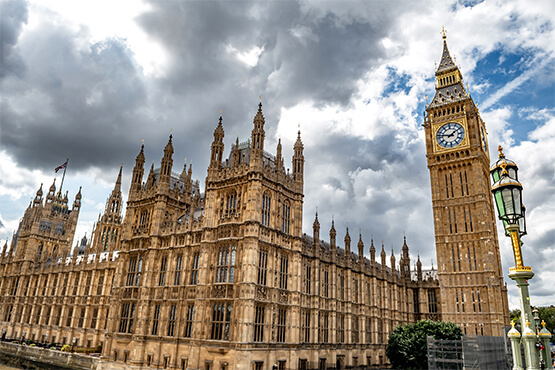The new Labour government has set out its legislative agenda for the next 12 months during the King’s Speech.
It features a series of proposed laws that it hopes will drive economic growth, create wealth and deliver positive change to working people’s lives.
Expert lawyers from across Browne Jacobson’s sector specialisms give their verdict on the government’s plans.
Planning reform to ‘get Britain building again’
Ben Standing, Partner specialising in planning and environmental law, said: “Labour’s ambition to get the planning system working quicker, cheaper and more effectively so that we can deliver the required housing and energy infrastructure is a commendable one, but there’s no magic wand to fix it, as consecutive governments have discovered.
“If the new government wants to make a real difference to building infrastructure in the short and medium terms, while also ensuring its flagship policy to establish Great British Energy is able to generate sufficient green power, there are two small changes to planning policy that can reap significant rewards – although they won’t be without their challenges.
“Firstly, it must clarify what the planning system will prioritise when giving weight to various considerations in planning applications to enable consistent decision-making across planning authorities.
“With so many environmental, legal and heritage issues to balance against potential benefits of development, a clear position at national level is required so that the strategic importance of new housing and infrastructure is a decisive factor.
“This is especially true in relation to large linear infrastructure, such as electricity transmission cables that span numerous planning authority areas. These pose issues like visual impact, so there must be a clear weighting in favour of key renewable infrastructure to clear planning hurdles.
“Secondly, the government must make it easier and cheaper for councils to update their local plans, which set out a pipeline for future development. This is currently a very burdensome and expensive task that involves many layers of bureaucracy and inspection, so loosening some of the most arduous tests they must pass would give the private sector a clear sense of direction when proposing new development.
“At the same time, the government must think more strategically about how it can update the National Planning Policy Framework to establish a definition for low-quality parts of the green belt – the so-called grey belt – to unlock further land for development.
“It should also seriously consider where exactly we want to build, with extensions to existing cities that already have much of the required public infrastructure arguably the best candidates for new development as this will also help to boost investment and raise economic output.”
Expanding devolution in England
Laura Hughes, Head of Public Law, said: “The further rollout of devolution in England has been welcomed by local leaders who feel they are best equipped with the knowledge of their areas to make the best decisions.
“Providing greater powers on issues such as local bus services will help to ensure a co-ordinated approach to transport
“However, devolution has become very fragmented with just over half the population covered by a devolution deal and varying degrees of power handed down to different areas. At the same time, these powers have taken on a degree of standardisation rather than addressing unique and complex sets of circumstances in each local area where devolution is present.
“So while we’ve seen some great examples of devolution delivering transformative benefits to trailblazer areas like Greater Manchester and the West Midlands, it’s debatable whether we can replicate this efficiently and effectively in other places without a more bespoke devolution model.
“For devolution to truly work, we need to get back to recognising that areas will require specific powers to deal with specific issues, and we hope the English Devolution Bill reflect this, allowing tailored deals driven by what the areas want and need.”
A move towards a preventative healthcare system
Carly Caton, Partner specialising in commercial healthcare, said: “Stating an ambition to move the dial from a curative to preventative healthcare system is exactly the type of bold thinking we need if we are to address failures in the NHS. The potential benefits are vast – healthier populations, reduced treatment costs, and a more proactive approach to health and wellbeing.
“The progressive smoking ban and limits on branded vape products is a solid step in the right direction, but we need to go much further and faster by learning from other parts of the world with advancements in this area.
“In Australia, there’s a huge focus on healthy lifestyle and education within school, which instils healthy habits from a young age to set the stage for lifelong preventative care behaviours.
“Canada and Singapore are further examples demonstrating proactive approaches to public health with an emphasis on preventative measures such as immunisations, screenings and pre-natal care, while the Japanese government runs public awareness campaigns and health screenings to target specific populations at higher risk for certain diseases.
“The UK government should explore alternative funding mechanisms, such as public-private partnerships or health impact bonds, to invest in innovative preventative care initiatives that can generate huge cost savings in the long run by reducing the burden of chronic diseases on healthcare systems.
“Collaboration between healthcare stakeholders should also be encouraged to develop regulatory frameworks that support the delivery of preventative care services while ensuring patient safety and quality of care.
“At the same time, emerging technologies like artificial intelligence can be harnessed to drive productivity and enhance treatments. A commitment to a strengthening safety frameworks is welcomed and the UK must now be willing to take a lead in working with international partners to develop a global approach that balances regulation with innovation.”
Ofsted inspections for multi-academy trusts
Katie Michelon, Partner in the education team, said: “The government has set out its intention to legislate to bring multi-academy trusts formally into the inspection system, confirming its manifesto pledge.
“There is currently no law under which Ofsted can carry out mandatory inspection of multi-academy trusts. The new legislation will also be designed to enable intervention action to be taken against trusts that are deemed to not be ‘performing to the highest standards’ following such inspection.
“These new powers will need to be supported by a suitable inspection framework for trusts, which we believe requires careful thought and focused consultation with the sector, no doubt building on responses already provided as part of Ofsted’s recent, broad consultation exercise, the ‘Big Listen’.”
Review of the national curriculum
Philip Wood, Senior Associate in the education team, said: “The Labour manifesto promised an expert-led review of the curriculum to ensure that it is rich, broad and inclusive. Presumably to ensure that all schools benefit from the new curriculum, the King’s Speech set out that the new Children’s Wellbeing Bill will require all state schools, no matter the type, to teach the national curriculum.
“Academies are currently free to determine their own curriculum and there are also some derogations that maintained schools can use.
“This requirement is not likely to be too controversial, given most do follow the national curriculum, but there will be some schools that have varied from the national curriculum and would need to make changes when the requirement is brought in.
“It also points to a broader theme of smoothing the differences between different types of state schools that we expect to be a feature of this government. The requirement itself will only come into force once the review and implementation of changes to the national curriculum is complete.”
Legal requirement for schools to run breakfast clubs and limit branded items for pupils
Victoria Hatton, Senior Associate in the education team, said: “A legal requirement for breakfast clubs in every primary school as part of the Children’s Wellbeing Bill could deliver key benefits to parents and pupils, but it brings a number of key potential issues for schools and trusts.
“They must now consider how their current provision is funded and operated, as well as when and how any new funding may be accessed and used. There may be a requirement to recruit new staff to supervise and run clubs, or to amend job descriptions, terms and conditions of existing staff to include breakfast club provision.
“Other practical issues include overarching legal duties and responsibilities in relation to operating breakfast clubs out of school hours, such as safeguarding, health and safety, public liability, risk assessments, first aid and other emergency provision.
“Should external providers be engaged to assist with delivery, there will also be legal agreements, information-sharing and costs associated with these arrangements.
“Meanwhile, schools must immediately begin to consider their branding requirements after it was announced that new legislation will limit the number of branded items of uniform and PE kits a school can require in order to bring down costs for families.
“Should this list be limited to a handful of items – such as a school blazer, tie and PE top – then this will unlikely require changing, although we await the specific maximum number allowed. As some schools have expanded their branding into items ranging from trousers to book bags, they will need to reflect on whether there’s sufficient justification for these.”
Cultural challenges for Great British Railways
Bradley Martin, Partner specialising in public procurement law, said: “A long-term ambition to bring rail services into public ownership is underpinned by admirable reasons, in particular to offer better services for passengers, but such a transition features numerous practical and legal hurdles.
“Britain’s rail operation is hugely complex, with Network Rail overseeing infrastructure and a number of train operating companies running services in different regions of the country.
“The government will take on responsibility for various contractual obligations with third parties, ranging from train manufacturers to caterers, while it will also have to ensure tens of thousands of people are successfully transferred from train operators to Great British Railways.
“This will present a host of complexities with pensions, salaries, benefits and working arrangements that will have fluctuated between different employers, but must now be standardised.
“One of the biggest challenges Great British Railways may then face is in driving cultural change once those train operating companies are effectively insourced back into the public sector, with the same people working under a new, joint organisational banner.”










































